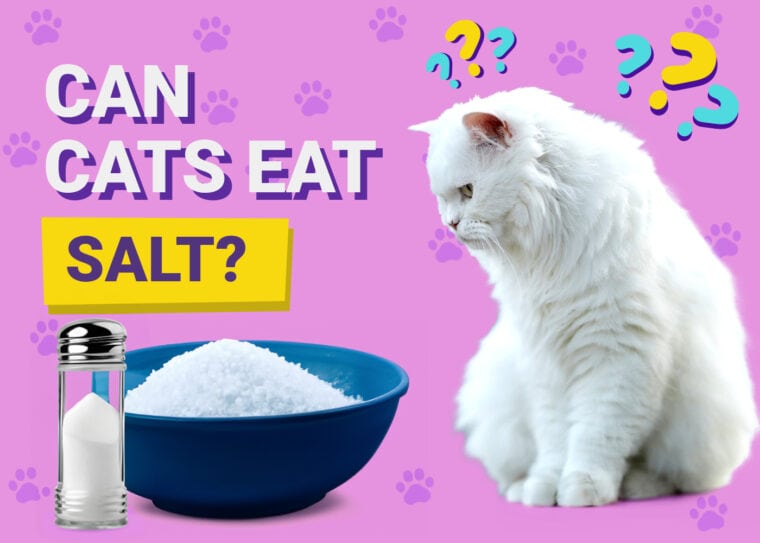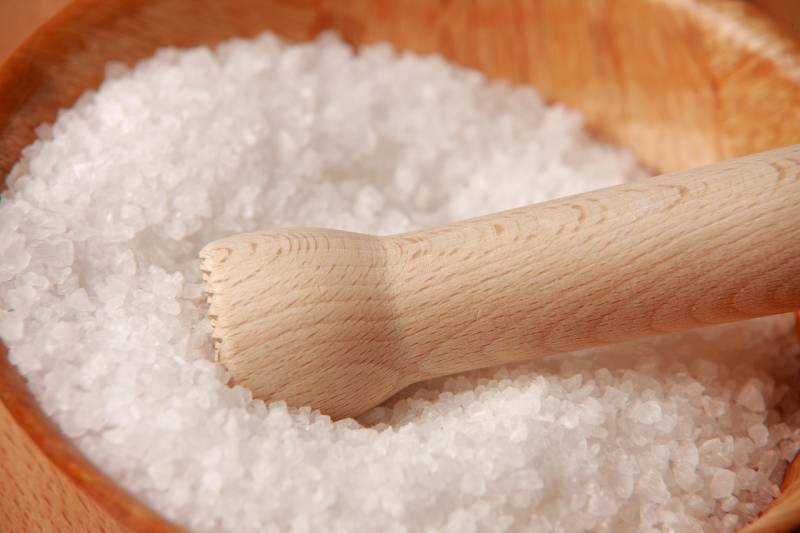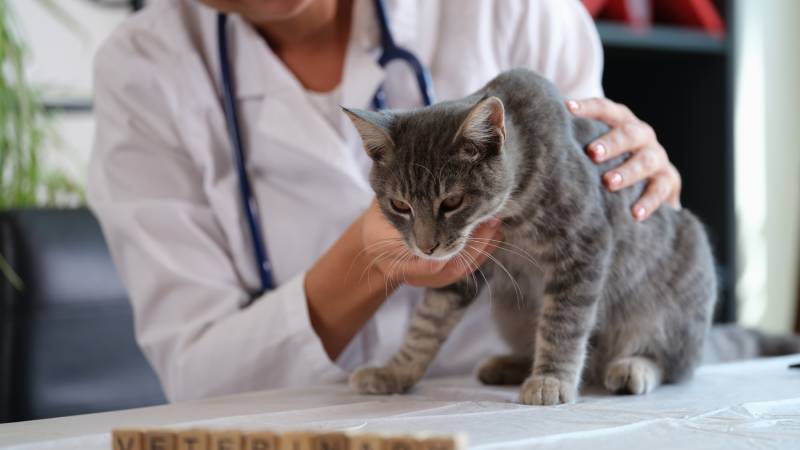
Click to Skip Ahead
A nutritious and well-balanced diet is crucial for any feline to properly develop and be healthy and strong. However, cats have unique dietary needs, so every responsible cat parent needs to know which foods will meet their nutritional requirements.
Cats are obligate carnivores, so their main food source should be meat. Still, many people have questions about cat-appropriate foods, including: Can cats eat salt?
These two have a love-hate relationship, as cats can technically eat salt but only in very limited amounts.
In this article, we dig deeper into cats eating salt, if they need it in their diets, how salt affects cats, and more!
Do Cats Need Salt in Their Diet?
Like humans, cats need salt in their diet because it normalizes their internal body functions. An adequate amount of sodium helps cats regulate their electrolyte levels and hydration, promotes normal nerve and muscle function, and even improves respiratory function.
However, consuming salt excessively will lead to several health problems in cats. Their bodies and digestive systems are not designed to manage large amounts of salt and, as for any mammal, salt is toxic in excess.

Should Cats Eat Salt?
Cats do not need to have salt supplemented in their diet unless recommended by your veterinary surgeon. Your cat’s salt/sodium requirements will be met by feeding them a complete and balanced commercial diet.
Cats do require salt in moderation in order to maintain normal body functions. However, the amount of salt that cats need in their diet is significantly lower than that of humans.
Since salt can cause harm to your cat’s health, you should be cautious when sharing salty foods with your furry friend and avoid keeping high-sodium foods within your feline’s reach.
How Does Eating Excess Salt Affect Cats?
Consuming large amounts of sodium or salt (sodium chloride) in a short period will cause harm to your cat and lead to salt toxicity (hypernatremia), which could be life threatening. This is especially true if there is no, or insufficient access to fresh water.
Salt Toxicity in Cats: Signs and Treatment
Salt toxicity can occur in many animals, including cattle, dogs, and cats. In felines, it can have fatal effects, which is why every responsible cat parent needs to know how to recognize the signs of salt toxicity and know how to react to help your furry companion.
Signs of Salt Toxicity in Cats
When cats eat salt in excess, the level of sodium in their blood increases, causing a disruption in water balance within the cells. These changes can cause dehydration of the brain and cellular damage and may result in death.
Salt poisoning can result in several different signs in your feline. One of the first indicators of toxicity is usually vomiting. Other signs of this salt toxicity in cats include:
If you notice any of these signs in your cat, it’s best to visit your vet immediately. They will be able to do the necessary testing and determine if your feline is experiencing salt poisoning.

Treatment of Salt Toxicity in Cats
When it comes to treating this problem in felines, time is of the essence; if your cat is showing signs, you should react rapidly, as your veterinarian will likely need to quickly reduce the amount of sodium in your cat’s body.
Most of the time, salt toxicity in cats is treated by providing special fluid therapy over several days in an attempt to correct the damage and bring your cat’s electrolytes back in balance.
Other treatments for salt toxicity in cats can include anti-nausea medications, antacids, as well as proper hydration to reduce gastrointestinal problems, keep your feline hydrated, and enable the excess sodium to leave your cat’s body.
The main goal of the treatment is to eliminate unnecessary sodium, keep your cat hydrated, and bring your cat’s electrolytes back to their normal balance.
How Can You Reduce the Risk of Salt Toxicity in Your Cat?
Although there’s no way to entirely prevent your cat from experiencing salt toxicity, there are several things that you can do to reduce the risk of this problem:

What Should You Do If Your Cat Eats Salt?
If you’ve seen that your cat has eaten salt, you’ll need to react calmly but rationally to prevent health problems. Here’s what you should do to help your feline:
It’s a good idea to come to the vet’s office prepared. The veterinarian might ask you the following questions about the incident:
Knowing answers to at least a few of these questions will make your vet’s job much easier and therefore, enable your cat to get treatment faster.

How Much Salt Is Too Much?
Ingesting large amounts of salt could severely impact your cat’s health, possibly causing poisoning. Salt toxicity in cats can occur due to consuming things like high-sodium human foods, table salt, baking soda, homemade play dough, and even seawater.
But how much salt is too much for your cat? This chart shows the toxic amount of sodium for average-sized and large cats.
|
Consumption of sodium, toxic amount |
|
|
Average-sized cats |
Large cats |
|
1–10 lbs. |
11–25 lbs. |
|
> 0.05 tbsp. |
> 0.05 tbsp. |
Is Salt Bad for Cats?
Salt isn’t necessarily bad for cats because they need salt in their diets for their bodies to function properly. However, eating too much salt could be dangerous.
Basically, salt can be a double-edged sword: Consuming the right amount can positively benefit cats, while consuming too much could damage their health.
Knowing exactly what your feline companion can and cannot eat will help you become the best pet parent. Recognizing that not all cat bowls are equal is also key! The Hepper NomNom Cat Bowl sets itself apart from traditional options by catering to the specific needs of cats. The innovative design offers whisker relief via shallow dishes and promotes digestion with a slight bowl elevation. Find out if the Hepper NomNom is right for your cat by clicking here.
At Pet Keen, we’ve admired Hepper for many years and decided to take a controlling ownership interest so that we could benefit from the outstanding designs of this cool cat company!
Final Thoughts
Cats can and should eat salt that is contained in a complete and balanced cat food. They do not need extra salt and you should be careful when sharing salty snacks with cats and ensure that they don’t consume it excessively.
By being responsible regarding your cat’s sodium intake and keeping salt and high-sodium items away from their reach, you’ll lower the chances of your cat experiencing salt toxicity and further health damage.
Featured Image Credit: mkupiec7, Pixabay








